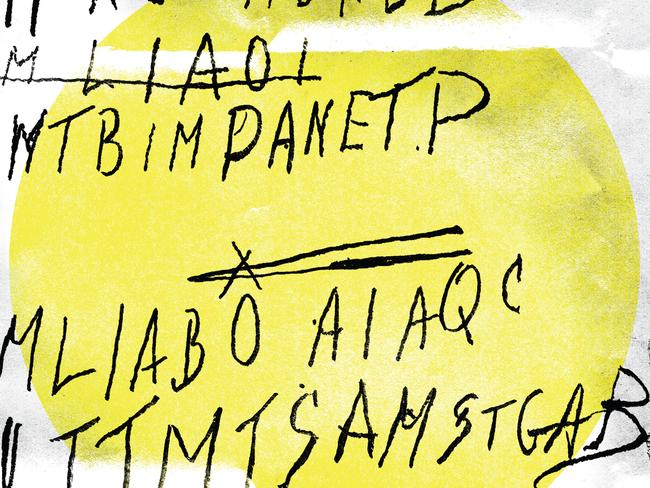Music reviews: Drones; Prince; Iggy Pop; Ben Winkelman; Young ’Uns
The new album from Australian rock act the Drones takes a considerable sonic leap from its predecessors.

The new album from Australian rock act the Drones takes a considerable sonic leap from its predecessors.
ROCK
Feelin Kinda Free
The Drones
Tropical F..k Storm Records
4 stars
There’s probably only one popular band in Australia that would choose to place an uncracked, handwritten code on the cover of its seventh studio album. Based in Melbourne, this quartet has built a career on following its own instincts and interests rather than chasing a crowd or pandering to the market.
That it is considered among Australia’s most consistent rock acts of the past decade is a testament to its songwriting smarts and unique sound.
Feelin Kinda Free is the sixth essential release by the Drones in 11 years; 2002 debut Here Comes the Lies was good, too, but showed a band still finding its direction and purpose. This collection betrays no such doubts, though it demonstrates a considerable sonic leap from what has come before.
The code on the cover is tied to first single Taman Shud, so named for the unsolved case of an unidentified man found dead on a beach in South Australia in 1948. Songwriter and guitarist Gareth Liddiard is evidently fascinated by this story, and bemused by Australian apathy towards it. “He’s gone and no one even cares at all / The earth won’t answer and the sea don’t mourn,” he spits during the first verse. Set against an insistent beat and spiky guitar lines, Liddiard rails against the mundane interests with which we instead fill our lives: watching MasterChef; renovating kitchens; fostering xenophobia and class warfare.
Tamad Shud is a pointed critique of popular culture, and its nearest thematic neighbour on this album is track six, Boredom, which appears to be written from the perspective of a refugee arriving in Australia and being overwhelmed by our lives of plenty. “It’s like nothing here is even real / You’re just so lucky that you get to feel / Boredom,” sings Liddiard, whose character drifts toward radicalisation: “Man, any kinda ‘ism’ beats a singing competition / On a TV fat with gnash and wail.”
These two tracks are being singled out because they bear the strongest link to the Drones’ past preference for sharp, fast rock songs with a message. But they are outliers among this set of eight songs, which finds the band — joined again by drummer Christian Strybosch, after Mike Noga vacated the stool following 2013’s I See Seaweed — reaching for a richer palette, and largely succeeding.
Its production decisions are consistently interesting, and will prove fascinating for any long-time fan: check out the spectral guitar solo in Then They Came for Me, which is subsumed in the final minute by Fiona Kitschin’s massively overdriven bass tone.
Or the marvellously dark and restrained second single, To Think that I Once Loved You, a six-minute slow burn built on electronic drums and ominous synth chords. It’s at once recognisable as the Drones but different too.
Overall, the collection isn’t quite as strong or has as big an impact as last heard on the stellar I See Seaweed, but listeners who invest in Feelin Kinda Free certainly won’t be feeling boredom.
Andrew McMillen
ALSO REVIEWED:
SOUL
Hit N Run Phase Two
Prince
NPG Records
4.5 stars
Originally available only in digital formats, Hit N Run Phase Two was pressed and given away to attendees of the Australian leg of Prince’s Piano and a Microphone tour. The title says much about the tour and the way it was announced and performed in a matter of weeks. It was a great way to bring attention to a new album, but somewhere in the midst of the hullabaloo the music got overlooked.
More than anything Hit N Run Phase Two (Phase One was released last year) sounds like a man with something to prove. He certainly hasn’t appeared to be trying so hard to impress since Purple Rain. If there were any questions about the 57-year-old’s abilities to match his heyday they are answered time and again. This is the album fans have been waiting for since at least 2004’s Musicology and maybe much longer.
When he’s on best form, as he is on almost everything here, it seems so effortless. Each song is crammed with ideas. It’s a dizzying experience where pop hooks vie for attention with funky bass, horn lines, massed backing vocals and lashings of the Purple One’s guitar. None get in the other’s way. The credits don’t make it clear who is playing what and how much the New Power Generation contributed but whether there are 10 players or they are performed by a one-man band the results are stunning.
He revisits a couple of his most famous licks in Rocknroll Loveaffair and Stare. The latter also contains a nod to some questionable gear of yesteryear when he recalls when “we used to go on stage in our underwear”. He may be dressing more conservatively these days but When She Comes and Screwdriver shows he maintains his direct approach to writing about sex.
It’s not all so playful. The arresting Baltimore is Prince’s response to the deaths of Michael Brown and Freddie Gray and the Black Lives Matter movement. The chant “if there ain’t no justice, there ain’t no peace” states his feelings clearly. He has created a classic 1970s soul sound, including a sizzling string section, that harks back to the time of the civil rights movement. Like the album, Baltimore speaks of the timelessness of the man’s music. Who knew he had another stone classic in him?
Polly Coufos
ROCK
Post Pop Depression
Iggy Pop
Caroline Australia
4 stars
By joining forces with one of modern rock
music’s greatest songwriting talents, Iggy Pop
has produced an album that will introduce
his unmistakable voice and sass to a new generation. From the clever title through to
the smallest flourishes of these nine tracks,
Post Pop Depression is an impressively polished and exciting collection that rates among his strongest work.
For his 17th studio album, Pop has hooked up with Josh Homme, frontman of Queens of the Stone Age and Them Crooked Vultures. The latter trio was completed by John Paul Jones (Led Zeppelin) and Dave Grohl (Foo Fighters), so Homme is no stranger to the dubious “supergroup” tag.
His unique musical fingerprints are all over this record, and the two players he tapped to join them in the studio — Arctic Monkeys drummer Matt Helders, and QOTSA multi-instrumentalist Dean Fertita — are perfectly suited to Pop’s alternately detached and impassioned baritone.
An array of moods and styles ensure that energy levels remain high throughout, but two songs in particular stand out. Gardenia is built on shimmering chords and an irresistible bass groove, with sparse verses that allow Pop’s yearning voice to shine as he searches for the titular character.
Sunday pivots on a busy rhythm section, while Homme’s jagged guitar phrases are heard in the right channel only; later, the six-minute track is haunted by a vocal melody (“Always ready / Always steady”) that’s topped off by an orchestral coda.
It’s a truly inspired composition, and anyone who has ever enjoyed Pop’s pop presence — from fronting punk rock progenitors the Stooges through to his later solo albums — should check it out to see how the 68-year-old has reinvented himself yet again.
Andrew McMillen
FOLK
Another Man’s Ground
The Young’Uns
Planet
3.5 stars
Aussie ensemble the Spooky Men’s Chorale has cast a spell over UK audiences in recent years with the unusual combination of consummate harmony singing and sharp SNAG-baiting satire. Currently, an equally accomplished and acclaimed a cappella act from northern England is attempting to follow suit in reverse with a contrastingly sombre and socially conscious repertoire.
The Young’Uns’ fourth album is tantamount to a celebration of British working class heroes past and present. Another Man’s Ground includes classics from the pens of those masters of political balladry and commentary, Billy Bragg and Ewan MacColl.
It’s a tribute to the Young’Uns’ stirring three-part harmony singing and broad Stockton accents that their renditions of Between the Wars and School Days Over are as potent as the original recordings of 30 and 50 years ago.
Not that resident composer Sean Cooney’s songs relating to local issues, such as You Won’t Find Me on Benefits Street, pull any punches: “Me grandad fought the fascists / Me father fought for a job / So I’ll fight anyone who tries / to stigmatise and fob”.
Moving far away from Teesside, the songsmith hits another bullseye with a ballad about the cold-blooded slaying of a Pakistani girl two years ago by her own flesh and blood: “When they came to the High Court her family were there / And sticks, stones and bricks flew through the air / And the streets of Lahore stood silent and mean /And smiled as they murdered Farzana Parveen”.
No less poignant are two songs based on World War I letters. Another worthy ode salutes the sadly neglected English humanitarian Tom Paine.
Tony Hillier
JAZZ
The Knife
Ben Winkleman Trio
Jazzhead
4 stars
Ben Winkelman, formerly of Melbourne and based in New York since 2010, has just released his fourth trio album, this one recorded in and inspired by New York. His first, Stomps, Pieces & Variations,appeared on Jazzhead in 2005. A national tour promoting the new album is under way this month.
Winkelman’s playing certainly has evolved since he moved to the US, but he remains interested in Afro-Cuban, Brazilian and klezmer music — the last a style of Jewish traditional music often played at weddings — as well as classical music, and incorporates these influences in his trio setting.
The 13 originals demonstrate Winkelman’s command of various jazz piano approaches: Silvia works through an uptempo post-bop piece with big luscious chords and a quick melodic line, while Remolacha (Spanish for sugar beet) employs a Latino rhythm, with suitably discursive piano treble, and allows wide scope for Sam Anning’s bass contributions, as well as for Eric Doob’s inventive percussion.
The title track uses brief semi-classical excursions in a composition that also includes a bluesy undercurrent and fast Art Tatum-like runs. The longest track, The Schlep, at more than seven minutes, features clever rhythmic hesitations, giving the bass an opportunity to weave through an emphasised solo, and Doob offers a punctuated passage between Winkelman’s chords.
While I Sleep successfully paints a dark scenario with dreamy passages, yet swings in a strong way, abetted by Anning’s solidly stable bass line perfectly integrated with the piano.
This is an album of great variety, showing that much can be achieved by a piano trio with imaginative compositions and skilled, unified players.
John McBeath


